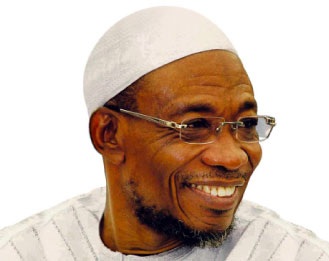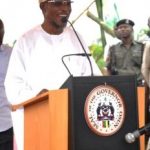
OPINION: Ogbeni’s Intervention
 • With his recent step, we hope the religious stir will give way to educational dividends in Osun State
• With his recent step, we hope the religious stir will give way to educational dividends in Osun State
The issue seemed innocuous at first. The Osun State governor, Ogbeni Rauf Aregbesola, started a programme to restructure and reclassify schools in an effort to redeem an educational system long lost in a rut. It was a massive affair involving close to 2,000 schools.
The project proceeded noiselessly until rumbles began in a few schools, about three, and the contention set the distinction between state and religion to the front burner. It first began as an accusation that the governor had instructed students to wear hijab, a Muslim wear, for all students, including Christian wards. It turned out a distortion, as the matter is litigation by a non-government body.
But the matter persisted and while it was quiet in virtually all the state, the rumpus became identified with Iwo town and not the whole town, but the Baptist High School.
What was the issue? It was that some parents did not want their children to abide in a school with children of other faiths – a school of interfaith. Some commentators fulminated that the governor was turning a forbidden issue into a tinderbox, and they had insisted that the governor reverse his programme because students of different faiths could not be forced to learn secular matters under the same roof.
The counter-argument was that the religious bodies that insisted ownership of the school’s lifestyle had not, since the takeover in 1976, contributed to the school equipment, curricula or infrastructure all these years. They did not also enlist when the governor introduced the free feeding to the students as part of the nourishment for education. Why were they waking up this late with a proprietary air because the schools, all Osun State schools, were undergoing perhaps the biggest wave of transformation any school system has witnessed in this country on a tab of about N30 billion?
It was clear that the matter of faith was no easy one when recently the students of differing faiths contested for sartorial supremacy. The governor intervened by visiting the school in his drama of sartorial solidarity. His was a peace mission, and it was highlighted by a six-man committee he set up to look into the matter with a view to putting the crisis behind. The committee included Gbadegesin Adedeji – its chairman. The others are T.A. Oni – who is secretary-, Israel Ajao, former assistant inspector-general of police, and Alhaji Bola Asafa.
Calm has reportedly returned to the schools and community, and what the governor has done chimes in with the highest tenets of all religions – harmony and peace among all people.
Ironically, Yorubaland is that last place we expect such scents of dissent based on faith. Historically the Yorubas have always lived peacefully in an ambience of Islam, Christianity and Ifa, and such distinction of syncretism has set them apart from other ethnic groups in West Africa.
It is also a tragedy that in contextualising the Iwo drama, commentators have failed to see that in all the close to 2,000 schools in the state, only a few see this as a matter of spilling bad blood. Even though the governor had said that he did not authorise a wear, why did the commentators not point out that he specifically introduced a uniform that bore no distinct religious vintage? He showcased this fact by wearing it to the school.
He said: “We are a product of the rule of law and this has guided all our actions. As we said in the past, we have not approved the use of hijab. I repeat it again for the hearing of mischief makers, who have been working tirelessly to bring religious war to our state. This government did not approve the use of hijab in any school before the matter went to court. It is the court’s position that the status quo be maintained until the case is determined.”
The governor had said this several times before February 10 when he visited Baptist High School. We hope that the committee will put paid to the stir and allow attention to turn to the massive school transformation in progress.
THE NATION
The project proceeded noiselessly until rumbles began in a few schools, about three, and the contention set the distinction between state and religion to the front burner. It first began as an accusation that the governor had instructed students to wear hijab, a Muslim wear, for all students, including Christian wards. It turned out a distortion, as the matter is litigation by a non-government body.
But the matter persisted and while it was quiet in virtually all the state, the rumpus became identified with Iwo town and not the whole town, but the Baptist High School.
What was the issue? It was that some parents did not want their children to abide in a school with children of other faiths – a school of interfaith. Some commentators fulminated that the governor was turning a forbidden issue into a tinderbox, and they had insisted that the governor reverse his programme because students of different faiths could not be forced to learn secular matters under the same roof.
The counter-argument was that the religious bodies that insisted ownership of the school’s lifestyle had not, since the takeover in 1976, contributed to the school equipment, curricula or infrastructure all these years. They did not also enlist when the governor introduced the free feeding to the students as part of the nourishment for education. Why were they waking up this late with a proprietary air because the schools, all Osun State schools, were undergoing perhaps the biggest wave of transformation any school system has witnessed in this country on a tab of about N30 billion?
It was clear that the matter of faith was no easy one when recently the students of differing faiths contested for sartorial supremacy. The governor intervened by visiting the school in his drama of sartorial solidarity. His was a peace mission, and it was highlighted by a six-man committee he set up to look into the matter with a view to putting the crisis behind. The committee included Gbadegesin Adedeji – its chairman. The others are T.A. Oni – who is secretary-, Israel Ajao, former assistant inspector-general of police, and Alhaji Bola Asafa.
Calm has reportedly returned to the schools and community, and what the governor has done chimes in with the highest tenets of all religions – harmony and peace among all people.
Ironically, Yorubaland is that last place we expect such scents of dissent based on faith. Historically the Yorubas have always lived peacefully in an ambience of Islam, Christianity and Ifa, and such distinction of syncretism has set them apart from other ethnic groups in West Africa.
It is also a tragedy that in contextualising the Iwo drama, commentators have failed to see that in all the close to 2,000 schools in the state, only a few see this as a matter of spilling bad blood. Even though the governor had said that he did not authorise a wear, why did the commentators not point out that he specifically introduced a uniform that bore no distinct religious vintage? He showcased this fact by wearing it to the school.
He said: “We are a product of the rule of law and this has guided all our actions. As we said in the past, we have not approved the use of hijab. I repeat it again for the hearing of mischief makers, who have been working tirelessly to bring religious war to our state. This government did not approve the use of hijab in any school before the matter went to court. It is the court’s position that the status quo be maintained until the case is determined.”
The governor had said this several times before February 10 when he visited Baptist High School. We hope that the committee will put paid to the stir and allow attention to turn to the massive school transformation in progress.
THE NATION



